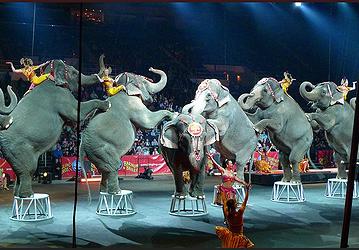
ELLENTON, Florida, March 7, 2015 (ENS) – The Ringling Bros. herd of elephants will only perform with the famous traveling circus for the next three years. The 13 elephants will then be retired to the Ringling Bros. Center for Elephant Conservation in Florida.
The release of the elephants from performing was announced Thursday by the Feld Family, owners of Feld Entertainment, Inc., the parent company of Ringling Bros. and Barnum & Bailey.
Under the plan, 13 elephants currently traveling with the three Ringling Bros. circus units will be relocated to the Ringling Bros. Center for Elephant for Conservation in Florida by 2018.

There they will join the rest of the Ringling Bros. herd of more than 40 elephants.
The Ringling Bros. Center for Elephant Conservation is home to the largest herd of Asian elephants and the most successful breeding program for this endangered species in the Western Hemisphere, the company says.
The circus will continue to feature other animal performers, including tigers, lions, horses, dogs and camels.
This unprecedented change in the 145-year old “Greatest Show On Earth” will allow the company to focus on its Asian elephant conservation programs, both here in North America and through its partnership with the island nation of Sri Lanka.
“This is the most significant change we have made since we founded the Ringling Bros. Center for Elephant Conservation in 1995,” said Kenneth Feld, Chairman and CEO of Feld Entertainment. “When we did so, we knew we would play a critical role in saving the endangered Asian elephant for future generations, given how few Asian elephants are left in the wild.”
“Since then, we have had 26 elephant births. No other institution has done or is doing more to save this species from extinction, and that is something of which I and my family are extremely proud,” said Feld. “This decision was not easy, but it is in the best interest of our company, our elephants and our customers.”

“Our family has been the proud steward of the American institution that is Ringling Bros. and Barnum & Bailey, and our elephants, for 45 years,” said Nicole Feld and Alana Feld, Ringling Bros. producers and executive vice presidents with Feld Entertainment. “It is a legacy that we hold near and dear to our hearts.”
“As the circus evolves, we can maintain our focus on elephant conservation while allowing our business to continue to meet shifting consumer preferences,” they said.
Wayne Pacelle, who heads the Humane Society of the United States, called the decision “a Berlin Wall moment” for elephant welfare.
“This was a company that fought animal welfare groups at every turn before city councils, in state legislatures, within Congress, in the courts, and in the press,” said Pacelle.
“The company infiltrated several nonprofit organizations by placing spies in them. Its leadership seemed to have limitless resources, and a fierce resolve to keep the elephants so deeply associated with its brand,” he said.
“And now, just like that, the company announces it will cease, by 2018, its use of elephants in circuses. Get the confetti and streamers. Grab the kids and the dog. Put on the party hat. Head over to the parade. Jump on what remains of the fallen wall and raise your arms,” Pacelle exulted.
Ringling Bros. cited the number of cities and counties that have recently adopted ordinances to restrict the use of elephants in circuses as contributing to its decision.
Now, the company is portraying itself as a “conservation organization.”
“The company will also continue to collaborate with other conservation organizations working to preserve this magnificent species for future generations,” said the Feld Family in a statement. “For example, the company has placed elephants at eight zoos, either on loan or through donations, and will continue to support the Smithsonian Institution’s research lab working to find a cure for diseases that impact juvenile elephants.”
Copyright Environment News Service (ENS) 2015. All rights reserved.
© 2015, Environment News Service. All rights reserved. Content may be quoted only with proper attribution and a direct link to the original article. Full reproduction is prohibited.
